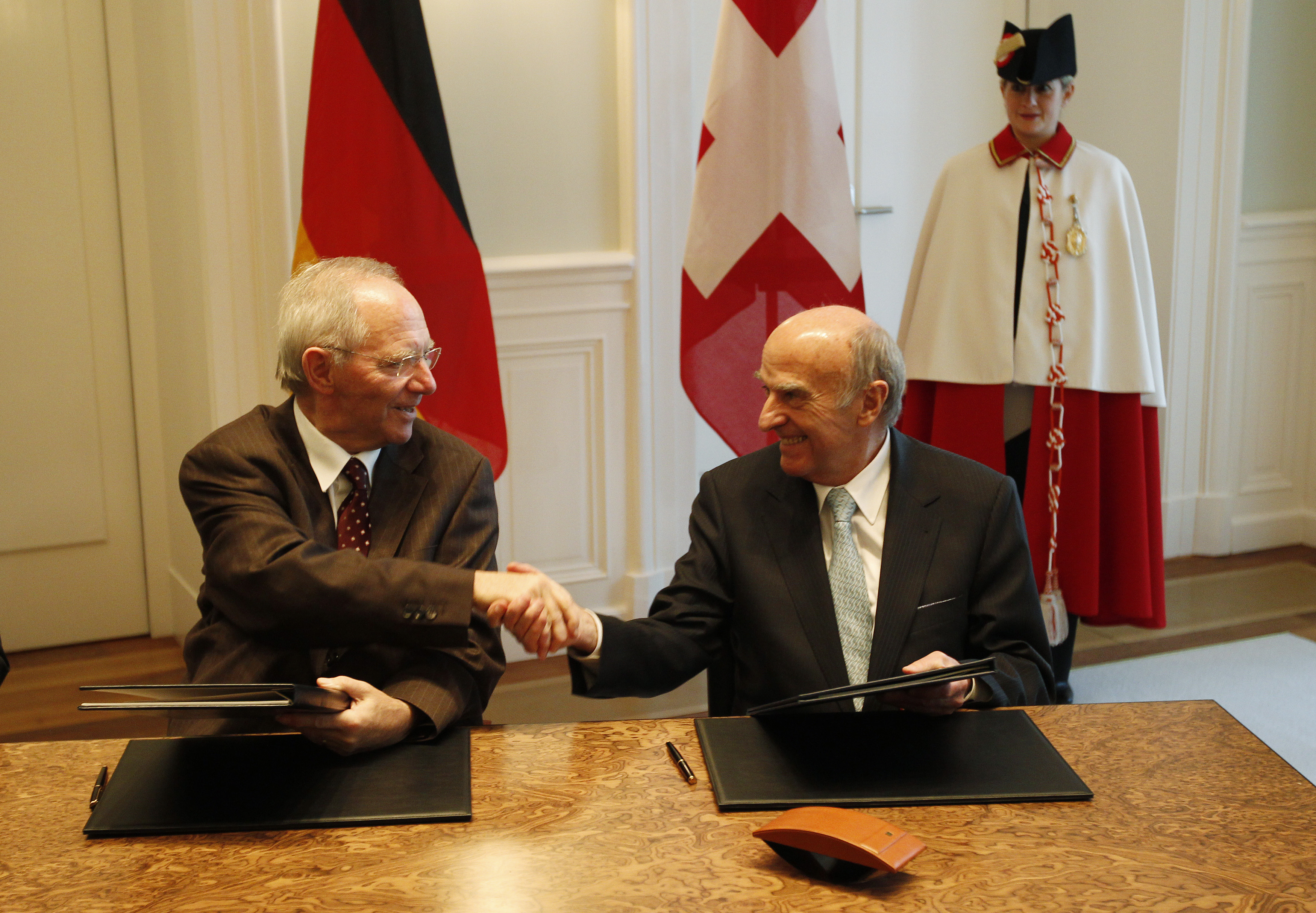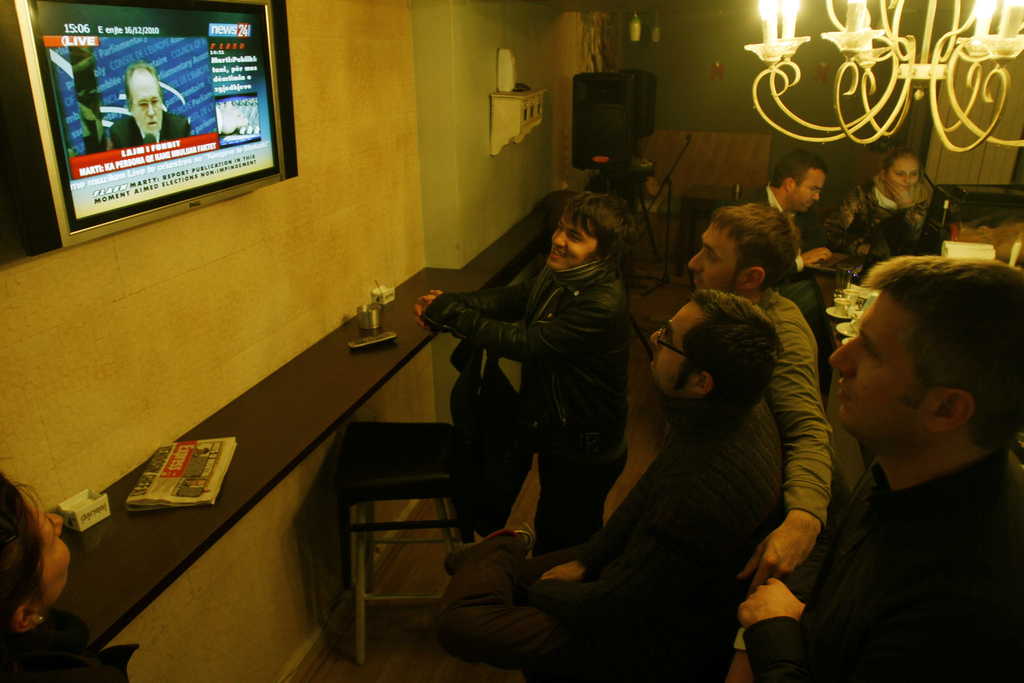Switzerland is again “an island of stability”

As 2010 draws to a close, it’s a time to ask how far events of the past year may impact on the year - and years - to come.
Paolo Dardanelli lectures in European and Comparative Politics at the University of Kent in Britain, and is a close observer of the Swiss scene. He looked back on the year for swissinfo.ch.
The economic turmoil that shook Europe and much of the rest of world has left its mark and isn’t over yet. Dardanelli says Switzerland has proved resilient partly because the country is seen as a safe haven and partly because of the diversity of its economy.
Dardanelli also discusses Switzerland’s reputation for human rights and says it cannot be seen as a shining example to the world.
swissinfo.ch: What immediately springs to mind when you think of Switzerland in 2010?
Paolo Dardanelli: What has struck me in particular is how Switzerland has performed economically in the current crisis. It has emerged again as an island of stability, and that’s very remarkable.
From here [Britain] the main story has been the competition coming from Switzerland in terms of being a more welcoming environment for financial activities. Some financial companies have moved from London to Geneva.
I think people in the financial industry in the City of London are worried. The general feeling that people have in this particular industry is that the regulatory environment here will be less accommodating that it was in the past, and Switzerland then becomes more attractive.
swissinfo.ch: How is it that Switzerland has managed to keep its head above water when all around people have been hit by the economic crisis?
P.D.: I think there are a number of factors. Of course the financial sector is very important and there were problems with UBS and so on [see related stories]. But partly it’s because of the structure of the Swiss economy, which is more diversified. The manufacturing sector is still quite strong. Of course it’s closely linked to the German economy, which has also picked up quite strongly. But what’s also important because of the turmoil in Europe and elsewhere, Switzerland – being a well-managed country – has re-emerged as a safe haven, taking up the role it used to have in the past.
Switzerland has done well so far – but it may pay a bit of a price in the next two or three years if the franc keeps going up, in terms of becoming too expensive vis-à-vis other countries.
swissinfo.ch: Of the European Union and Switzerland, which need each other most?
P.D.: Both need each other. I guess it would be difficult to say that Europe needs Switzerland as much as Switzerland needs Europe, because of course the relationship is asymmetrical. Switzerland is eight million people versus 500 million.
Of course the EU needs Switzerland, because it’s in the heart of Europe geographically, it’s very important in a number of industries, and it’s become increasingly important because more and more companies that operate across Europe are actually headquartered in Switzerland.
But the other way round, Switzerland’s been integrated in a piecemeal sort of fashion with Europe, and it’s very dependent on the European markets.
swissinfo.ch: Is Switzerland becoming more isolationist?
P.D.: Certain signals may point in that direction, but I don’t think that will be the case. It seems to me that if relations with the EU become more difficult to manage with the current arrangements, there will be greater polarisation [in Switzerland]. There would be a very strong current of opinion in favour of isolationism but I don’t think it would be in the majority, because at the end of the day Switzerland has always struck me as being pragmatic in its attitude to foreign policy, and has proven able to adapt to changing circumstances.
The economic interests of the country obviously are not in favour of radical isolation from Europe and the rest of the world. So I don’t think the isolation option will prevail over the other one.
swissinfo.ch: Has Switzerland’s reputation as a haven of human rights been dented with the vote to expel criminal foreigners, and the minaret ban last year? Or could something like [Swiss senator] Dick Marty’s report on Kosovo tip the balance the other way?
P.D.: I think that to a certain extent the image of the country has been damaged. I haven’t seen a lot of coverage abroad of the expulsion vote, but certainly the vote on the minarets, and especially the pending lawsuit with the Council of Europe: if Switzerland is found to be in breach of the European Convention on Human Rights that certainly will have a significant and negative impact.
At the same time this needs to be put into context: across Europe there has been a hardening of attitudes on these issues, so Switzerland is not isolated in that sense.
But certainly it cannot present itself as a beacon for human rights, because it’s very much part of this wider trend.
As for the report on Kosovo [see related stories], I don’t think many people will make the connection between the author of the report and Switzerland. I think the politics of that will be played very much in terms of the West versus Serbia, and how the West tolerated certain practices. I don’t think Switzerland will be particularly affected.
Early 2010: German Länder decide to buy CDs with stolen data on Swiss bank clients; staff at Credit Suisse subsequently investigated by German tax authorities.
Jun: Swiss hostage in Libya, Max Göldi, returns home after serving a four month jail sentence.
Jun: parliament approves 10 new dual tax agreements, which removes Switzerland from OECD “grey list” of tax havens.
Jun: After initially rejecting it, Parliament endorses deal to hand over confidential UBS data about suspected tax evaders to US tax authorities.
Jun-Jul: Football World Cup in South Africa; Switzerland eliminated in the first round despite beating Spain, the eventual winners.
Jul: Swiss decide not to extradite filmmaker Roman Polanski to the US, and releases him from house arrest.
Sep: US dollar falls below Swiss franc and stays there.
Sep: Cabinet elections to replace two outgoing ministers result in first ever Swiss government with a female majority.
Oct: Switzerland and Germany start talks on legalising undeclared assets in Swiss banks.
Oct: Gotthard base tunnel pierced, the longest rail tunnel in the world.
Nov: Swiss voters approve initiative for the automatic expulsion of foreign criminals.
Dec: Swiss senator Dick Marty presents controversial report accusing Kosovo prime minister of involvement of trafficking in human organs.
Dec: Euro continues to fall: it has lost 16% against the franc since the start of the year.
Paolo Dardanelli lectures in European and Comparative Politics at the University of Kent.
He is deputy director of the university’s Centre for Federal Studies, which he helped establish.
He was born in the Italian city of Turin in 1963 and studied at the universities of Turin and Durham and the London School of Economics.
His research interests circle around the connections between statehood, nationality and democracy.

In compliance with the JTI standards
More: SWI swissinfo.ch certified by the Journalism Trust Initiative













You can find an overview of ongoing debates with our journalists here . Please join us!
If you want to start a conversation about a topic raised in this article or want to report factual errors, email us at english@swissinfo.ch.